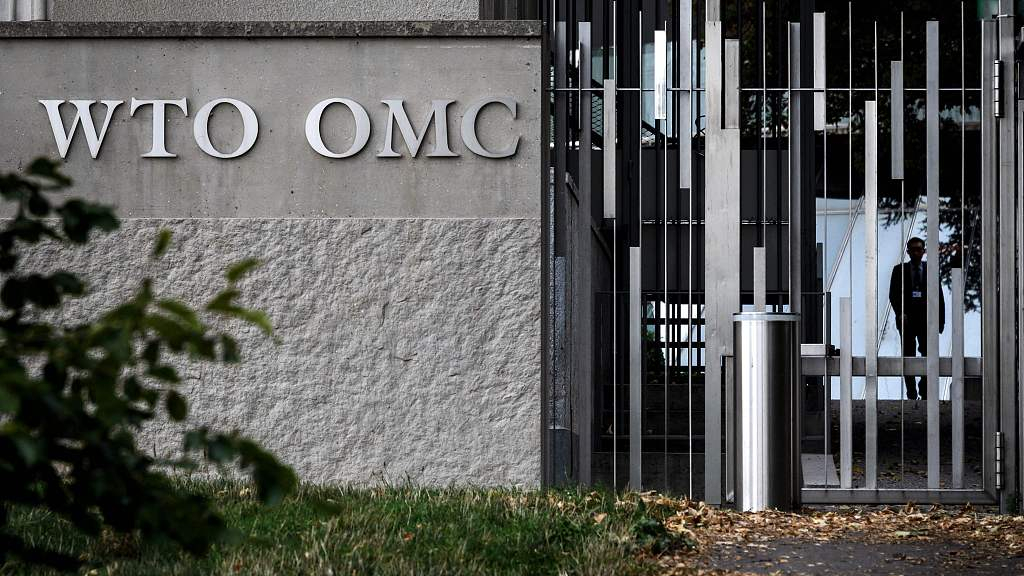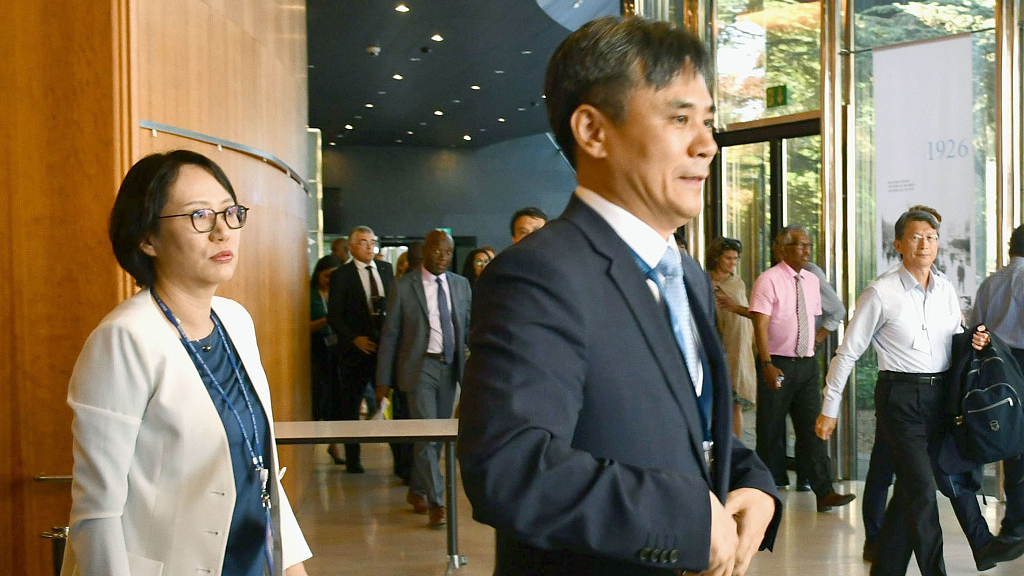
Editor's note: Rostam J. Neuwirth is a professor of law, head of the Department for Global Legal Studies, Faculty of Law University of Macau (China). The article reflects the author's views and not necessarily those of CGTN.
After December 10, one of the principal functions of the World Trade Organization (WTO), which is to settle trade disputes, will be seriously impeded. The reason is that from December 11, 2019, onwards, the centerpiece of the dispute settlement system of the WTO, the Appellate Body, will have become paralyzed and dysfunctional.
Due to the fact that the United States has blocked the appointment of new members since mid-2017, and akin to the title of Agatha Christie's famed mystery novel "And Then There Were None," the Appellate Body will, on this date, only have one solitary member left (out of a total of seven).
This means the Appellate Body will have fewer than the three members required to hear appeals from reports issued by panels in future disputes brought by WTO members. It is also likely that it will not even be able to complete the pending ones.
The imminent paralysis of the WTO's dispute settlement system may even put the survival of the WTO as a whole in peril, or elevate it to the status of an "endangered species" in the realm of the global rule of law. This danger calls for immediate action on behalf of all WTO members to work toward the resolution of the Appellate Body crisis.
The history of the creation of the WTO based on the General Agreement on Tariffs and Trade (GATT) in 1948 suggests that a profound solution to the dispute settlement impasse cannot be realized without a comprehensive reform of the entire global governance system. The current deadlock in procedural terms has its roots in wider substantive disagreements caused by an important historical incident that occurred in the late 1940s.
To briefly recall, the WTO was created in 1995 as the successor of the General Agreement in Tariffs and Trade (GATT), which governed international trade in goods from 1948 until 1994. The WTO was adopted as a "single package" and expanded the multilateral trading regime from trade in goods (GATT) to trade in services (GATS) and intellectual property rights (TRIPS).
It also introduced a more rule-based system for the settlement of international trade disputes between WTO members, notably by introducing an innovative two-tiered and rule-based WTO dispute settlement system.
Generally, the creation of the WTO can be said to have improved the governance of global trade relations, but it failed to enhance the functioning of the existing international legal order as a whole.

Kim Seung Ho, a deputy minister at South Korea's Ministry of Trade, Industry and Energy, is pictured after the first day of a WTO General Council meeting convened in Geneva on July 23, 2019, to discuss Japan's imposition of restrictions on some key exports for South Korea's high-tech industry, a step seen by Seoul as retaliation in an ongoing dispute over wartime labor. /VCG Photo
Kim Seung Ho, a deputy minister at South Korea's Ministry of Trade, Industry and Energy, is pictured after the first day of a WTO General Council meeting convened in Geneva on July 23, 2019, to discuss Japan's imposition of restrictions on some key exports for South Korea's high-tech industry, a step seen by Seoul as retaliation in an ongoing dispute over wartime labor. /VCG Photo
This is, first and foremost, because the present international system still suffers from a major rift between the governance of political affairs under the aegis of the United Nations on the one hand and the governance of economic affairs under the aegis of the WTO on the other.
Originally, this rift was caused by the initial failure of an International Trade Organization (ITO) to materialize due to the refusal of the U.S. Congress to ratify it.
Today, this rift is most visible in the recent rise of the invocation of so-called "national security exception" as a means to justify various unilateral trade-restrictive measures.
Second, on a broader level, the rift is also manifest in the failure to address the so-called "trade linkage debate," i.e., how to best reconcile the tensions arising from various "trade and…" problems, such as "trade and culture," "trade and the environment," or "trade and development." Thus, the failure to reconcile these trade concerns with so-called non-trade concerns has often attracted severe criticism of some of the WTO's rulings for failing to duly address these so-called "non-trade concerns," such as the environment, food safety, cultural diversity or public health. This criticism directed at the WTO disputes settlement system, however, failed to acknowledge the limitations in the constitutional mandate of the WTO, which was restricted to deciding cases based on the covered agreements, i.e., the WTO agreements, alone.
Third, there are further shortcomings in the substantive regulation of global trade, like those found in the distinction between the nature of goods and services in times of a growing importance of electronic commerce. Their separation has gained further significance in a time where "big data" is considered the "new oil" and where national data localization measures threaten the further liberalization of cross-border trade in both goods and services.
To solve the crisis, numerous WTO members, including the EU, China, Canada, India, Norway, New Zealand, Switzerland, Australia, the Republic of Korea, Iceland, Singapore and Mexico, had circulated a document in November 2018 outlining some proposals to reform the Appellate Body.
In July 2019, the EU and Canada also announced as a measure to temporarily mitigate the negative effects of the crisis by agreeing on an interim appeal arbitration arrangement based on an "interim appeal arbitration procedure" in line with existing WTO rules.
Roughly at the same time, the BRICS countries, which account for around 22 percent of global GDP, also reiterated their support for the WTO dispute settlement mechanism at their most recent BRICS Summit in Brasilia, Brazil.
These signs of strong support for a rule-based multilateral trading regime, as well as the global governance system as a whole, are encouraging. Yet, the history of the global trading regime suggests that the dispute resolution crisis cannot be overcome without a comprehensive institutional reform and a comprehensive project for the renegotiation of the substantive international trade obligations.
For achieving this objective, time is short as the Twelfth WTO Ministerial Conference (MC12) is scheduled to be held next year from June 8-11, 2020, in Nur-Sultan, Kazakhstan, which provides an opportunity to solve the major problems leading to the current crisis. In the end, the "know-how" for the solution of the world's most serious global governance problems is available, but it now takes the political will and courage to solve them.
(If you want to contribute and have specific expertise, please contact us at opinions@cgtn.com.)